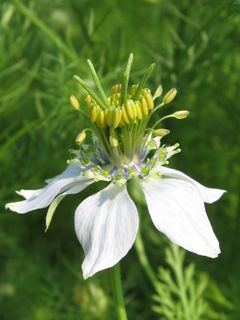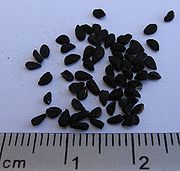Nigella sativa
| Nigella sativa | |
|---|---|
 |
|
| Scientific classification | |
| Kingdom: | Plantae |
| Division: | Magnoliophyta |
| Class: | Magnoliopsida |
| Order: | Ranunculales |
| Family: | Ranunculaceae |
| Genus: | Nigella |
| Species: | N. sativa |
| Binomial name | |
| Nigella sativa L. |
|
Nigella sativa is an annual flowering plant, native to southwest Asia. It grows to 20–30 cm (7.9–12 in) tall, with finely divided, linear (but not thread-like) leaves. The flowers are delicate, and usually coloured pale blue and white, with 5–10 petals. The fruit is a large and inflated capsule composed of 3–7 united follicles, each containing numerous seeds. The seed is used as a spice.
Contents |
Etymology

In English, Nigella sativa seed is variously called fennel flower, nutmeg flower, Roman coriander, blackseed or black caraway. Other names used, sometimes misleadingly, are onion seed and black sesame, both of which are similar-looking but unrelated. The seeds are frequently referred to as black cumin (as in Bengali: kalo jira, kalo jeera, kali jeera), but this is also used for a different spice, Bunium persicum. The scientific name is a derivative of Latin niger "black".[1]
An older English name gith is now used for the corncockle. In English-speaking countries with large immigrant populations, it is also variously known as "karum cheerakam" in Tamil, kalonji (Hindi कलौंजी kalauṃjī or कलोंजी kaloṃjī) or mangrail (Hindi मंगरैल), ketzakh (Hebrew קצח), chernushka (Russian), çörek otu (Turkish), habbat al-barakah (Arabic حبه البركة ḥabbat al-barakah "seed of blessing") or siyah daneh (Persian سیاهدانه siyâh dâne) or كلونجى in Urdu. "Karim Jeerakam" in Malayalam.
It is used as part of the spice mixture panch puran[2] and by itself in a great many recipes in Bengali cookery and most recognisably in Naan Bread.[3]
The Turkish name çörek otu literally means "bun's herb" from its use in flavoring the çörek buns. Such braided-dough buns are widespread in the cuisines of Turkey and its neighbors (see Tsoureki τσουρέκι). In Bosnian, the Turkish name for Nigella sativa is respelled as čurekot. The seed is used in Bosnia, and particularly its capital Sarajevo, to flavor pastries (Bosnian: somun) often baked on Muslim religious holidays.
Characteristics
Nigella sativa has a pungent bitter taste and smell. It is used primarily in confectionery and liquors. The variety of naan bread called Peshawari naan is as a rule topped with kalonji seeds.
History
According to Zohary and Hopf, archeological evidence about the earliest cultivation of N. sativa "is still scanty", but they report that N. sativa seeds have been found in several sites from ancient Egypt, including Tutankhamun's tomb.[4] Although its exact role in Egyptian culture is unknown, it is known that items entombed with a pharaoh were carefully selected to assist him in the after life.
The earliest written reference to N. sativa is thought to be in the book of Isaiah in the Old Testament where the reaping of nigella and wheat is contrasted (Isaiah 28: 25, 27). Easton's Bible dictionary states that the Hebrew word ketsah refers to N. sativa without doubt (although not all translations are in agreement). According to Zohary and Hopf, N. sativa "was another traditional condiment of the Old World during classical times; and its black seeds were extensively used to flavor food."[4]
History of Medicine
Nigella sativa has been used for medicinal purposes for centuries, both as a herb and pressed into oil, in Asia, Middle East, and Africa. It has been traditionally used for a variety of conditions and treatments related to respiratory health, stomach and intestinal health, kidney and liver function, circulatory and immune system support, as analgesic, antiinflammatory, antiallergic, antioxidants, anticancer, antiviral and for general well-being.
In Islam, it is regarded as one of the greatest forms of healing medicine available. Prophet Mohammed once stated that the black seed can heal every disease—except death—as recounted in the following hadith:
[Sahih Muslim : Book 26 Kitab As-Salam, Number 5489]
Abu Huraira reported that he heard Allah's Messenger as saying: Nigella seed is a remedy for every disease except death.
Narrated Khalid bin Sa'd :We went out and Ghalib bin Abjar was accompanying us. He fell ill on the way and when we arrived at Medina he was still sick. Ibn Abi 'Atiq came to visit him and said to us, "Treat him with black cumin. Take five or seven seeds and crush them (mix the powder with oil) and drop the resulting mixture into both nostrils, for 'Aisha has narrated to me that she heard the Prophet saying, 'This black cumin is healing for all diseases except As-Sam.' 'Aisha said, 'What is As-Sam?' He said, 'Death.' " (Bukhari)
[Sahih Muslim : Book 26 Kitab As-Salam, Number 5490]
Abu Huraira reported Allah's Messenger as saying: There is no disease for which Nigella seed does not provide remedy.
Avicenna, most famous for his volumes called The Canon of Medicine, refers to nigella as the seed that stimulates the body's energy and helps recovery from fatigue and dispiritedness. It is also included in the list of natural drugs of 'Tibb-e-Nabavi', or "Medicine of the Prophet", according to the tradition "hold onto the use of the black seeds for in it is healing for all diseases except death" (Sahih Bukhari vol. 7 book 71 # 592).
In the Unani Tibb system of medicine, N. sativa is regarded as a valuable remedy for a number of diseases.
The seeds have been traditionally used in the Middle East and Southeast Asian countries to treat ailments including asthma, bronchitis, rheumatism and related inflammatory diseases, to increase milk production in nursing mothers, to promote digestion and to fight parasitic infections. Its oil has been used to treat skin conditions such as eczema and boils and to treat cold symptoms. Its many uses have earned nigella the Arabic approbation 'Habbatul barakah', meaning the seed of blessing.
Scientific research
Black cumin oil contains nigellone, which protects guinea pigs from histamine-induced bronchial spasms[5] (perhaps explaining its use to relieve the symptoms of asthma, bronchitis, and coughing).
The presence of an anti-tumor sterol, beta-sitosterol, lends credence to its traditional use to treat abscesses and tumors of the abdomen, eyes, and liver.[6]
Nigella sativa oil has been reported to be effective in treating opioid dependence.[7]
Nigella sativa also has been reported to reduce calculi formation in rats' kidneys.[8]
Thymoquinone and pancreatic cancer treatment
Researchers at the Kimmel Cancer Center at Thomas Jefferson University in Philadelphia have found that thymoquinone, an extract of Nigella sativa seed oil, blocked pancreatic cancer cell growth and killed the cells by enhancing the process of programmed cell death, (apoptosis). While the studies are in the early stages, the findings suggest that thymoquinone could eventually have some use as a preventative strategy in patients who have gone through surgery and chemotherapy or in individuals who are at a high risk of developing cancer.[9]
See also
- Nigella (Genus)
References
- ↑ New International Encyclopedia
- ↑ http://en.wikipedia.org/wiki/Panch_phoron
- ↑ http://www.chow.com/recipes/10516
- ↑ 4.0 4.1 Domestication of plants in the Old World (3 ed.). Oxford University Press. 2000. p. 206. ISBN 0198503563.
- ↑ Effect of Nigella Sativa on Isolated Guinea Pig Trachea - PDF
- ↑ Look for sterols at http://glycoscience.org/glycoscience/linksPage/links.html Click on the 4th listing for the GlycoScience link. (Link is dead of 2008-1-12)
- ↑ Role Of Nigella Sativa In Opioid Dependence
- ↑ http://www.sid.ir/En/VEWSSID/J_pdf/83020070206.pdf
- ↑ Traditional herbal medicine kills pancreatic cancer cells, researchers report
External links
- Kalonji - by Dr. M. Laiq Ali Khan
- Nigella sativa
- Nigella from The Encyclopedia of Spices
- Pharmacological and toxicological properties of Nigella sativa. - abstract
- Antimicrobial activity of Nigella sativa oil against Staphylococcus aureus and Pseudomonas aeruginosa obtained from clinical specimens.
- Effects of Black Seeds (Nigella Sativa) on Spermatogenesis and Fertility of Male Albino Rats
- Effects of oral administration of water extract of Nigella sativa on serum concentrations of insulin and testosterone in alloxan-induced diabetic rats
|
||||||||||||||||||||||||||||||||||||||||||